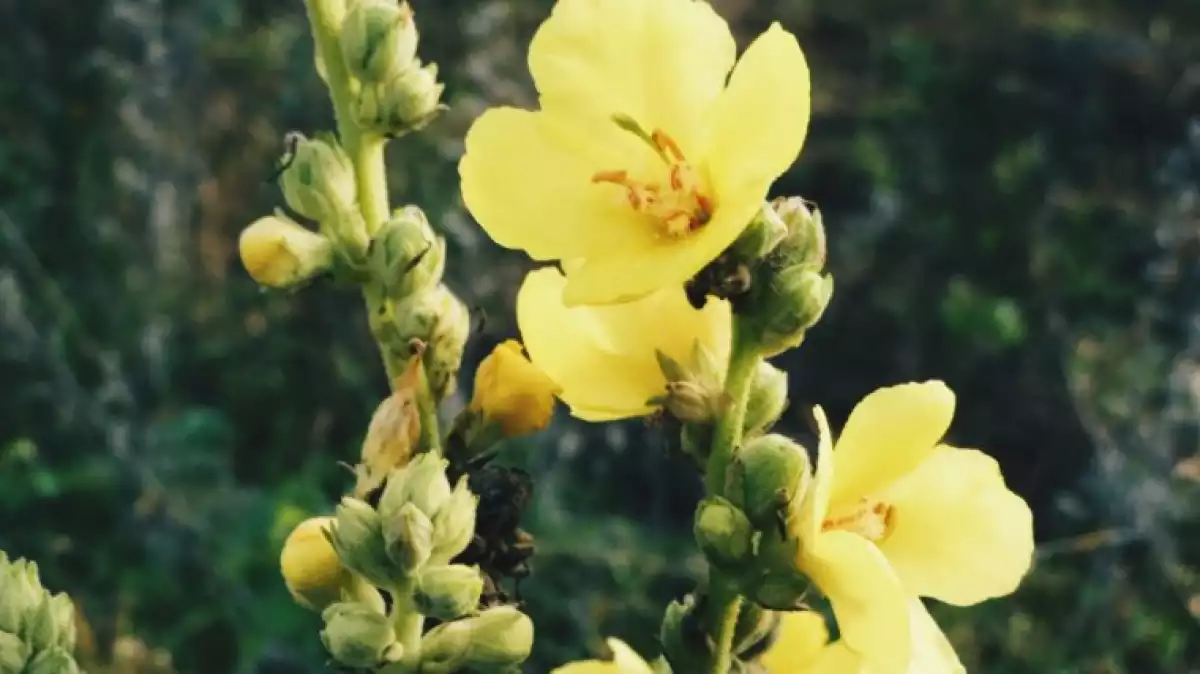
Mullein is a medicinal plant that has therapeutic applications to treat some respiratory diseases, intestinal disorders, hemorrhoids, and even for cellulite. Its expectorant properties are effective to stop smoking.
In this article, we will revise what mullein is, its properties and benefits, and its uses. To finish, we will tell you about the contraindications of this medicinal herb.
What is mullein?
Verbascum thapsus is the scientific name of the plant popularly known as mullein or common mullein, and less common as gordolobo. It belongs to the Scrophulariaceae family, and its origin is mainly European although it is also natural from Asia, Africa, and North America.
It is a medicinal plant that is usually used as an effective remedy for respiratory diseases such as bronchitis or asthma. It is also used to treat other types of hearing, skin, and pain-related conditions.
Regarding its characteristics, mullein is a biennial herbaceous plant that grows in dry soils and can measure up to 2 m height. It has oval-shaped leaves which form a floral stem, and its flowers are a very nice light yellow.
All the species of this plant have the same medicinal actions. The flowers and the leaves of the mullein plant are used for internal and external use. Flowers are collected during the months or June, July, August, and September. They are commonly used in infusions.
Likewise, mullein leaves have medicinal compounds but in less quantity. When consuming mullein internally, it is important to strain the infusions to eliminate the stamens of the flowers of this plant that have very fine hairs that can irritate the respiratory tract. Due to its expectorant and mucolytic effects, it is used to treat smoking addiction.
Mullein is mainly used in tea or infusion, but there are also dyes, dry extracts, sanitary towels, poultices, and even macerated oils, which is used as an ointment that can be used as an antibiotic and anti-inflammatory.
Properties of the mullein plant
As mentioned before, the mullein species are used mainly to treat respiratory system pathologies. Balsamic properties of this plant were used in Ancient Greece and Rome as a medicinal plant.
In addition, Roman women used the yellow pigment of the mullein flower to dye their hair and have a blonder color.
Some of its active ingredients, such as saponin, mucilage, and iridoid, have antispasmodic, anti-inflammatory, and analgesic properties to treat colds and congestion. This activity is also effective to relieve dry cough and saponins help stimulate cough with mucus.
Combined with thyme, mullein increases its expectorant properties. It also has antiallergic benefits due to an active ingredient known as aucubin. Mucilage has emollient and demulcent actions that soften the vocal cords and relieve hoarseness.
It is also a medicinal plant rich in flavonoids and saponins which have diuretic effects. Lastly, mullein also has antibacterial, anti-inflammatory and antibiotic natural properties, as well as healing ones.

Mullein uses
The previously mentioned mullein properties make it a specific medicinal plant to treat from colds and pulmonary congestions to hearing problems such as otitis. It can also relieve hemorrhoids, toothache and serve as a natural antibiotic. In the following lines, we list its primary uses.
1. Respiratory disease treatment
The infusions made out of its flowers reduce the formation of mucus and stimulates cough with phlegm. It also relieves respiratory tract irritations and helps treat illnesses such as:
Bronchitis
Tracheitis
Pharyngitis
Laryngitis
Colds
Some symptoms of tuberculosis
Chronic obstructive pulmonary disease (COPD)
Hoarseness
Throat irritation
2. Hearing problems relief
Verbascum thapsus is also a natural remedy to alleviate otitis or other ear infection symptoms. Its antibiotic and anti-inflammatory effects work as a traditional treatment for this kind of illnesses including ringing or buzzing in the ears.
3. Treatment for skin conditions
Mullein gel is useful to treat skin problems. Its effects can work to treat burns, chilblains and as a stimulant to heal wounds.
4. Remedy against cellulite
The essential oil extracted from mullein can help treat cellulite due to its antibiotic qualities. These actions also help relieve toothache and hemorrhoids.
5. Treatment for intestinal problems
The astringent and anti-enteric actions contained in some compounds of this plant are effective in treating some intestinal disorders such as gastroenteritis, diarrhea, and general upset stomach. An infusion made from the flowers of this herb may also facilitate digestion.

Contraindications
Mullein is a plant that has toxic ingredients in its roots and seeds. A lot of mulleins can cause symptoms such as sedation and irritating effects on the respiratory system. Verbascum thapsus is contraindicated for those who:
Have hepatic diseases
Take anticoagulants
Have a damaged eardrum
Present plant allergy
Pregnant women
Nursing women
However, the adverse effects of mullein in pregnant or nursing women are not known, but its consumption must be avoided as a preventive method.
It is also not recommended for children as there may be a risk of allergy. Due to its high amount of coumarins, it is not suitable for treating people with jaundice, hepatitis, or other liver-related diseases. These same active ingredients may increase the effect of anticoagulant drugs and thus interact with the drug.
- Original article in viviendolasalud.com: Gordolobo (Verbascum thapsus): para qué sirve, propiedades y contraindicaciones
References
Hanrahan, C., & Frey, R. J. (2005). Mullein. In J. L. Longe (Ed.), The Gale Encyclopedia of Alternative Medicine (2nd ed., Vol. 3, pp. 1390-1392). Detroit, MI: Gale.
